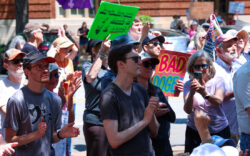February is Black History Month, an annual observance that traces its roots back nearly a century, to 1926. In that year, African-American historian and educator Carter Woodson called for a week of remembrance of Black history every February, the month when both President Abraham Lincoln and Frederick Douglass were born. The event became a month-long observance in 1976. February continues to be an appropriate month for recalling Black history, since civil rights activists Rosa Parks and John Lewis both were born in February, and the historic sit-in demonstrations against segregated restaurants in the Jim Crow South began in February of 1960.
The history of African Americans has lessons for all Americans today. Whole libraries could be filled with books on the subject. Here are just a few books on African-American history that can provide enjoyment and edification for all Americans during Black History Month and any other time of the year.
The Encyclopedia of Black America, edited by scholars W. Augustus Low and Virgil A. Clift, was first published more than 40 years ago, and it still stands as an academic reference book that is also fun to read. From baseball legend Hank Aaron to engineer Ronald Zanders, the people and places of African-American history march A to Z through the pages of this book.
A Pictorial History of Black Americans first appeared in 1956, when it was published by Harlem Renaissance poet Langston Hughes, along with co-writers Milton Meltzer and Eric Lincoln. It is still a popular work today, offering hundreds of illustrations and photographs depicting African-American life and achievement throughout this nation’s times. This book came out in the days of black-and-white television, and its black-and-white images are reminiscent of a TV documentary from the ‘50s, but its graphics and text show that this informative and entertaining pictorial cavalcade is still compelling “infotainment” today.
This summer marks the 60th anniversary of the murders of three civil rights workers by white supremacists in Mississippi in 1964. We Are Not Afraid by Seth Cagin and Philip Dray is a look back at that crime. Taking its title from words in the civil rights anthem “We Shall Overcome,” this book takes readers back to the days when young whites from the North worked alongside Black people from the South to oppose the American apartheid of Jim Crow segregation in Mississippi. Some lost their lives in that struggle. We Are Not Afraid is their story.
John Lewis personified Black history. The youngest man to speak at the March on Washington in 1963, Lewis was beaten by Alabama police in 1965 during a march supporting voting rights for the state’s African-American citizens. Lewis went on to become a U.S. congressman and a lifelong crusader for the American ideal of justice for all. His autobiography, Walking With the Wind, is an inspiring saga of a boy born to sharecropper parents who became a man called “the conscience of Capitol Hill.” Lewis died in 2020, leaving behind a book aptly titled Carry On: Reflections For a New Generation. It is a touching compilation of insights and observations from a longtime activist speaking his last words to the world.
Rosa Parks was justly called “the mother of the movement.” In 1955 she refused to move to the segregated section of a city bus in Montgomery, AL. Her arrest sparked a boycott of the bus company by the city’s Black citizens, led by a young and then-unknown minister named Martin Luther King Jr. Quiet Strength is a collection of the views of Rosa Parks on such subjects as fear, defiance, injustice, youth and the future of America. It encapsulates the wisdom of a life well lived.
King has been the subject of countless books, but A Testament of Hope: The Essential Writings of Martin Luther King Jr. is indispensable. Gathered between its covers are King’s speeches, essays, books and interviews. Today, when self-anointed censors bring book-banning battles to American libraries, we should all remember King’s prescient warning: “Nothing in all the world is more dangerous than sincere ignorance and conscientious stupidity.”
Like what you just read? Support Flagpole by making a donation today. Every dollar you give helps fund our ongoing mission to provide Athens with quality, independent journalism.









